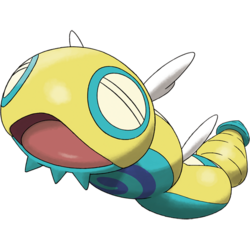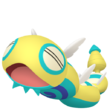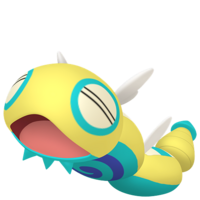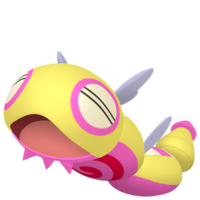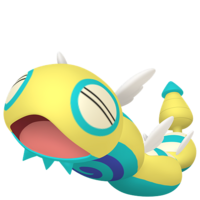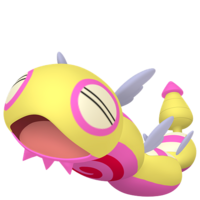From Bulbapedia, the community-driven Pokémon encyclopedia.
|
|
| Line 115: |
Line 115: |
| {{Dex/Header|type=Normal}} | | {{Dex/Header|type=Normal}} |
| {{Dex/NA|gen=IX}} | | {{Dex/NA|gen=IX}} |
| {{Dex/Gen/1|gen=IX|reg1=Paldea|num1=189}} | | {{Dex/Gen/2|gen=IX|reg1=Paldea|num1=189|reg2=Kitakami|num2=161}} |
| {{Dex/Form|Two-Segment Form}} | | {{Dex/Form|Two-Segment Form}} |
| {{Dex/Entry1|v=Scarlet|t=FFF|entry=This Pokémon uses its hard tail to make its nest by boring holes into bedrock deep underground. The nest can reach lengths of over six miles.}} | | {{Dex/Entry1|v=Scarlet|t=FFF|entry=This Pokémon uses its hard tail to make its nest by boring holes into bedrock deep underground. The nest can reach lengths of over six miles.}} |
Revision as of 19:45, 14 September 2023
Dudunsparce (Japanese: ノココッチ Nokokocchi) is a Normal-type Pokémon introduced in Generation IX.
It evolves from Dunsparce when leveled up while knowing Hyper Drill.
Dudunsparce has two separate forms: Two-Segment Form and Three-Segment Form. When Dunsparce evolves, it has a 1/100 chance of evolving into Three-Segment Form Dudunsparce.
(Refer to Game data→Form data for more details.)
Biology
Dudunsparce is a serpentine Pokémon that looks nearly identical to its pre-evolution, Dunsparce. It has the same yellow body with a blue underside and blue and cream stripes on its back. It sports three "prongs" on its blue chin and its eyes are now partially opened up, revealing its two pupiless white colored scleras. It has a dark blue spiral pattern on the underside of its first body segment, and its tail has a blue "cap" on it.
The most notable change Dudunsparce has compared to its pre-evolution is that its body is longer, having gained segments that are similar to Dunsparce's original body. According to a study, Dudunsparce's number of segments is determined by its genes. Each segment has its own pair of wings and back pattern. Dudunsparce is also able to inflate its first body segment to greatly increase its size. Two-Segment Form Dudunsparce have two pairs of body segments, with two blue stripes and a pair of two-feathered wings on the first body segment, and one blue stripe and a pair of one-feathered wings on the second. Some Dudunsparce have the Three-Segment Form instead, which has an additional body segment after the head; this segment has three blue stripes and a pair of three-feathered wings.
Dudunsparce makes its nest, which can reach over six miles (10 km) long, by using its hard tail to bore holes into bedrock deep underground. It drives enemies out of its nest by inhaling air with its long, narrow lungs, and then releasing it in an intense blast. It is also known to be gentle, however, and will carry Pokémon wandering into its nest on its back and guide them outside.
Dudunsparce and its pre-evolved form are the only known Pokémon capable of learning the move Hyper Drill.
Forms
Dudunsparce has two separate forms: Two-Segment Form and Three-Segment Form.
Two-Segment
Form
|
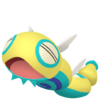
|
|
Three-Segment
Form
|

|
|
Evolution
Dudunsparce evolves from Dunsparce.
In the anime
Major appearances
Minor appearances
In the manga
In the TCG
- Main article: Dudunsparce (TCG)
Game data
Pokédex entries
| This Pokémon was unavailable prior to Generation IX.
|
| Generation IX
|
|
Paldea
#189
|
|
Kitakami
#161
|
| Two-Segment Form
|
| Scarlet
|
This Pokémon uses its hard tail to make its nest by boring holes into bedrock deep underground. The nest can reach lengths of over six miles.
|
| Violet
|
It drives enemies out of its nest by sucking in enough air to fill its long, narrow lungs, then releasing the air in an intense blast.
|
| Three-Segment Form
|
| Scarlet
|
The gentle Dudunsparce will put Pokémon that wander into its nest onto its back and carry them to the entrance.
|
| Violet
|
A recent study uncovered that the number of segments a Dudunsparce’s body has is determined by the Pokémon’s genes.
|
|
|
Game locations
| This Pokémon was unavailable prior to Generation IX.
|
|
|
In side games
Held items
Stats
Base stats
| Stat
|
Range
|
| At Lv. 50
|
At Lv. 100
|
125
|
|
185 - 232
|
360 - 454
|
100
|
|
94 - 167
|
184 - 328
|
80
|
|
76 - 145
|
148 - 284
|
85
|
|
81 - 150
|
157 - 295
|
75
|
|
72 - 139
|
139 - 273
|
55
|
|
54 - 117
|
103 - 229
|
Total: 520
|
Other Pokémon with this total
|
- Minimum stats are calculated with 0 EVs, IVs of 0, and (if applicable) a hindering nature.
- Maximum stats are calculated with 252 EVs, IVs of 31, and (if applicable) a helpful nature.
|
Type effectiveness
| Under normal battle conditions in Generation IX, this Pokémon is:
|
|
|
|
|
|
|
|
|
|
|
|
|
Learnset
|
|
|
|
- Bold indicates a move that gets STAB when used by Dudunsparce
- Italic indicates a move that gets STAB only when used by an Evolution of Dudunsparce
|
|
|
|
|
- Bold indicates a move that gets STAB when used by Dudunsparce
- Italic indicates a move that gets STAB only when used by an Evolution or an alternate form of Dudunsparce
|
|
|
|
|
- Moves marked with an asterisk (*) must be chain bred onto Dudunsparce
- Bold indicates a move that gets STAB when used by Dudunsparce
- Italic indicates a move that gets STAB only when used by an Evolution of Dudunsparce
|
|
|
|
|
- Bold indicates a move that gets STAB when used by Dudunsparce
- Italic indicates a move that gets STAB only when used by an Evolution of Dudunsparce
|
Side game data
Form data
Dudunsparce has two non-interchangeable forms: Two-Segment Form and Three-Segment Form. Aside from a weight difference, the difference between the two forms is purely aesthetic. The form Dunsparce evolves into is determined based on its encryption constant, with a 99% chance of it evolving into the Two-Segment Form and a 1% chance of it evolving into the Three-Segment Form. This is not the case for wild Dudunsparce (including those encountered in Tera Raid Battles), as these will always be in Two-Segment Form regardless of their encryption constant value.[1] Despite being visually different, these two forms share the same menu sprite (except in Pokémon HOME).
Since Natures were determined via personality value prior to Generation V (which itself is indistinct from encryption constants prior to Generation VI), a Hardy Nature Dunsparce with the Ability Serene Grace that is transferred from Generation III or IV to Generation IX will have a 50% chance of evolving into Three-Segment Form Dudunsparce, whereas Dunsparce from the same generations with other Natures or the Ability Run Away will always evolve into the Two-Segment Form.
Evolution data
Sprites
| This Pokémon was unavailable prior to Generation IX.
|
|
|
Trivia
- Three-Segment Form Dudunsparce is the tallest Normal-type Pokémon.
- Dudunsparce's cry is composed from Dunsparce's cry, pitched down and with a portion of it repeated multiple times.
Origin
Dudunsparce appears to be based on the snake-like Tsuchinoko cryptid of Japan. Its multiple segments may also be inspired by some sphinx moth caterpillars (some mimic snakes, which leads to them being mistaken for Tsuchinoko). Its gourd-shaped body may be a reference to gourd-shaped sake bottles, given that the tsuchinoko was said to have a taste for alcohol. Dudunsparce may also be based on the Nozuchi, which is another snake-like yokai with caterpillar traits but larger and more ferocious than the Tsuchinoko.
The appearance of Dudunsparce's segmentation is similar to the ultrabithorax genetic mutation, observed in the fruit fly. The mutation essentially results in the development of a second thorax directly behind the first, complete with its own extra set of wings.
Name origin
Dudunsparce may be derived from a partial repetition of Dunsparce, in reference to the former's multi-segmented appearance as well as having an appearance nearly identical to its pre-evolution. It may also be a combination of double or dud (possibly referencing its pre-evolution's almost-useless wings and tendency to remain motionless and inactive, or Dudunsparce's aforementioned relative lack of visual changes from its pre-evolution) and Dunsparce.
Nokokocchi may be derived from a partial repetition of ノコッチ Nokocchi (Dunsparce), for the same reasons mentioned above.
In other languages
| Language
|
Title
|
Meaning
|
 Japanese Japanese
|
ノココッチ Nokokocchi
|
From a partial repetition of ノコッチ Nokocchi
|
 French French
|
Deusolourdo
|
From deux and Insolourdo
|
 Spanish Spanish
|
Dudunsparce
|
Same as English name
|
 German German
|
Dummimisel
|
From a partial repetition of Dummisel
|
 Italian Italian
|
Dudunsparce
|
Same as English name
|
 Korean Korean
|
노고고치 Nogogochi
|
From a partial repetition of 노고치 Nogochi
|
 Mandarin Chinese Mandarin Chinese
|
土龍節節 / 土龙节节 Tǔlóngjiéjié
|
From 土龍 / 土龙 tǔlóng, 土龍弟弟 / 土龙弟弟 Tǔlóngdìdì, 節 / 节 jiē, and possibly a pun of 姐姐 jiějie
|
 Cantonese Chinese Cantonese Chinese
|
土龍節節 Tóulùhngjitjit
|
From 土龍 tóulùhng, 土龍弟弟 Tóulùhngdàihdái, and 節 jit
|
|
|
|
| More languages
|
 Thai Thai
|
โนโกก็อจจิ Nokokotchi
|
Transcription of Japanese name
|
|
|
|
Related articles
References
External links

|
This Pokémon article is part of Project Pokédex, a Bulbapedia project that aims to write comprehensive articles on each Pokémon species, as well as Pokémon groups and forms.
|
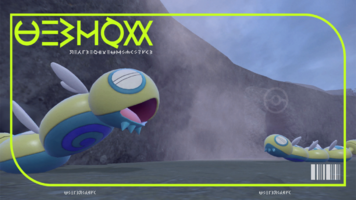
 For other sprites and images, please see Dudunsparce images on the Bulbagarden Archives.
For other sprites and images, please see Dudunsparce images on the Bulbagarden Archives.
